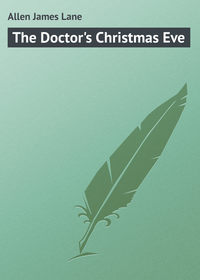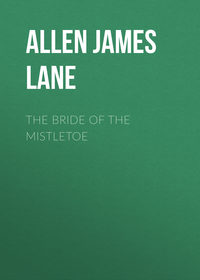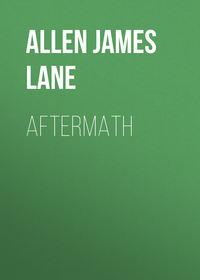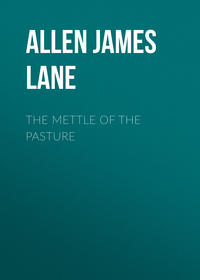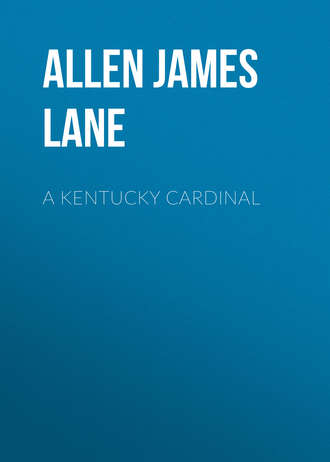 полная версия
полная версияA Kentucky Cardinal
It is far past midnight now, and I have not slept or wished for slumber.
Constantly since darkness came on I have been watching Georgiana's window for the light of her candle, but there has been no kindly glimmer yet. The only radiance shed upon the gloom outside comes from the heavens. Great cage-shaped white clouds are swung up to the firmament, and within these pale, gentle, imprisoned lightnings flutter feebly to escape, fall back, rise, and try again and again, and fail.
. . . A little after dark this evening I carried the red-bird over to Georgiana. . . .
I have seen her so little of late that I did not know she had been away from home for days. But she expected to-night, or, at furthest, to-morrow morning. I left the bird with the servant at the door, who could hardly believe what he saw. As I passed out of my front gate on my way there, the boy who returns about that time from the pasture for his cows joined me as I hurried along, attracted by the fluttering of the bird in the cage.
"Is it the red-bird? I tried to ketch him once," he said, with entire forgiveness of me, as having served him right, "but I caught something else. I'll never forget that whipping. Oh, but wouldn't I like to have him! Mr. Moss, you wouldn't mind my trying to ketch one of them little bits o' brown fellows, would you, that hops around under them pine-trees? They ain't no account to nobody. Oh my! but wouldn't I like to have him! May I bring my trap some time, and will you help me to ketch one o' them little bits o' brown ones? You can beat me ketchin' 'em!"
Several times to-night I have gone across and listened under Georgiana's window. The servant must have set the cage in her room, for, as I listened, I am sure I heard the red-bird beating his head and breast against the wires. Awhile ago I went again, and did not hear him. I waited a long time. . . . He may be quieted. . . .
Ah, if any one had said to me that I would ever do what I have done, with what full, deep joy could I have throttled the lie in his throat! I put the trap under one of the trees where I have been used to feed him. When it fell he was not greatly frightened. He clutched the side of it, and looked out at me. My own mind supplied his words: "Help! I'm caught! Take me out! You promised!" When I transferred him to the cage, for a moment his confidence lasted still. He mounted the perch, shook his plumage, and spoke out bravely and cheerily. Then all at once came on the terror.
The dawn came on this morning with its old splendor. The birds in my yard, as of old, poured forth their songs. But those loud, long, clear, melodious, deep-hearted, passionate, best-loved notes! As the chorus swelled from shadowy shrubs and vines to the sparking tree-tops I listened for some sound from Georgiana's room, but over there I saw only the soft, slow flapping of the white curtains like signals of distress.
Towards ten o'clock, wandering restless, I snatched up a book, which I had no wish to read, and went to the arbor where I had so often discoursed to Sylvia about children's cruelty to birds. Through the fluttering leaves the sunlight dripped as a weightless shower of gold, and the long pendants of young fruit swayed gently in their cool waxen greenness. Where some rotting planks crossed the top of the arbor a blue-jay sat on her coarse nest; and presently the mate flew to her with a worm, and then talked to her in a low voice, as much as saying that they must now leave the place forever. I was thinking how love softens even the voice of this file-throated screamer, when along the garden walk came the rustle of a woman's clothes, and, springing up, I stood face to face with Georgiana.
"What have you done?" she implored.
"What have you done? I answered as quickly.
"Oh, Adam, Adam! You have killed it! How could you? How could you?"
". . . Is he dead, Georgiana? Is he dead?. . ."
I forgot everything else, and pulling my hat down over my eyes, turned from her in the helpless shock of silence that came with those irreparable words.
Then in ungovernable anger, suffering, remorse, I turned upon her where she sat: "It is you who killed him! Why do you come here to blame me? And now you pretend to be sorry. You felt no pity when pity would have done some good. Trifler! Hypocrite!
"It is false!" she cried, her words flashing from her whole countenance, her form drawn up to repel the shock of the blow.
"Did you not ask me for him?"
"No!"
"Oh, deny it all! It is a falsehood—invented by me on the spot. You know nothing of it! You did not ask me to do this! And when I have yielded, you have not run to reproach me here and to cry, 'How could you? How could you?'"
"No! No! Every word of it—"
"Untruth added to it all! Oh, that I should have been so deceived, blinded, taken in!"
"Adam!"
"Lovely innocence! It is too much! Go away!"
"I will not stand this any longer!" she cried. "I will go away; but not till I have told you why I have acted as I have."
"It is too late for that! I do not care to hear!"
"Then you shall hear!" she replied. "You shall know that it is because I have believed you capable of speaking to me as you have just spoken; believed you at heart unsparing and unjust. You think I asked you to do what you have done? No! I asked you whether you would be willing to do it; and when you said you would not, I saw then—by your voice, your eyes, your whole face and manner—that you would. Saw it as plainly at that moment, in spite of your denial, as I see it now—the cruelty in you, the unfaithfulness, the willingness to betray. It was for this reason—not because I heard you refuse, but because I saw you consent—that I could not forgive you."
She paused abruptly and looked across into my face. What she may now have read in it I do not know. Then anger swept her on:
"How often had I not heard you bitter and contemptuous towards people because they are treacherous, cruel! How often have you talked of your love of nature, of our inhumanity towards lower creatures! But what have you done?
"You set your fancy upon one of these creatures, lie in wait for it, beset it with kindness, persevere in overcoming its wildness. You are amused, delighted, proud of your success. One day—you remember?—it sang as you had always wished to hear it. It annoyed you, and you threw a stone at it. With a little less angry aim you would have killed it. I have never seen anything more inhuman. How do I know that some day you would not be tired of me, and throw a stone at me? When a woman submits to this once, she will have them thrown at her whenever she sings at the wrong time, and she will never know when the right time is.
"Then you thought you were asked to sacrifice it, and now you have done that. How do I know that some day you might not be tempted to sacrifice me?" She paused, her voice breaking, and remained silent, as if unable to get beyond that thought.
"If you have finished," I said, very quietly, "I have something to say to you, and we need not meet after this.
"I trapped the bird; you trapped me. I understood you to ask something of me, to cast me off when I refused it. Such was my faith in you that beneath your words I did not look for a snare. How hard it was for me to forgive you what you asked is my own affair now; but forgive you I did. How hard it was to grant it, that also is now, and will always be, my own secret. I beg you merely to believe this: knowing it to be all that you have described—and far more than you can ever understand—still, I did it. Had you demanded of me something worse, I should have granted that. If you think a man will not do wrong for a woman, you are mistaken. If you think men always love the wrong that they do for the women whom they love, you are mistaken again.
"You have held up my faults to me. I knew them before. I have not loved them. Do not think that I am trying to make a virtue out of anything I say; but in all my thoughts of you there has been no fault of yours that I have not hidden from my sight, and have not resolved as best I could never to see. Yet do not dream that I have found you faultless.
"You fear I might sacrifice you to something else. It is possible. Every man resists temptation only to a certain point; every man has his price. It is a risk you will run with any.
"If you doubt that a man is capable of sacrificing one thing that he loves to another that he loves more, tempt him, lie in wait for his weakness, ensnare him in the toils of his greater passion, and learn the truth.
"I make no defence—believe all that you say. But had you loved me, I might have been all this, and it would have been nothing."
With this I walked slowly out of the arbor, but Georgiana stood beside me. Her light touch was on my arm.
"Let me see things clearly!"
"You have a lifetime in which to see things clearly," I answered. "How can that concern me now?" And I passed on into the house.
During the morning I wandered restless. For a while I lay on the grass down behind the pines. How deep and clear are the covered springs of memory! All at once it was a morning in my boyhood on my father's farm. I, a little Saul of Tarsus among the birds, was on my way to the hedge-rows and woods, as to Damascus, breathing out threatenings and slaughter. Then suddenly the childish miracle, which no doubt had been preparing silently within my nature, wrought itself out; for from the distant forest trees, from the old orchard, from thicket and fence, from the wide green meadows, and down out of the depths of the blue sky itself, a vast chorus of innocent creatures sang to my newly opened ears the same words: "Why persecutest thou me?" One sang it with indignation; another with remonstrance; still another with resignation; others yet with ethereal sadness or wild elusive pain. Once more the house-wren aloud, "per-se-cu-test—per-se-cu-test—per-se-cu-test—per-se-cu-test!" And as I peeped into the brush-pile, again the brown thrush, building within, said, "thou—thou—thou!"
Through all the years since I had thought myself changed, and craved no greater glory than to be accounted the chief of their apostles. But now I was stained once more with the old guilt, and once more I could hear the birds in my yard singing that old, old chorus against man's inhumanity.
Towards the middle of the afternoon I went away across the country—by any direction; I cared not what. On my way back I passed through a large rear lot belonging to my neighbors, and adjoining my own, in which is my stable. There has lately been imported into this part of Kentucky from England the much-prized breed of the beautiful white Berkshire. As I crossed the lot, near the milk-trough, ash-heap, and paring of fruit and vegetables thrown from my neighbor's kitchen, I saw a litter of these pigs having their awkward sport over some strange red plaything, which one after another of them would shake with all its might, root and tear at, or tread into greater shapelessness. It was all there was left of him.
I entered my long yard. If I could have been spared the sight of that! The sun was setting. Around me was the last peace and beauty of the world. Through a narrow avenue of trees I could see my house, and on its clustering vines fell the angry red of the sun darting across the cool green fields.
The last hour of light touches the birds as it touches us. When they sing in the morning, it is with the happiness of the earth; but as the shadows fall strangely about them, and the helplessness of the night comes on, their voices seem to be lifted up like the loftiest poetry of the human spirit, with sympathy for realities and mysteries past all understanding.
A great choir was hymning now. On the tops of the sweet old honeysuckles the cat-birds; robins in the low boughs of maples; on the high limb of the elm the silvery-throated lark, who had stopped as he passed from meadow to meadow; on a fence rail of the distant wheat-field the quail—and many another. I walked to and fro, receiving the voice of each as a spear hurled at my body. The sun sank. The shadows rushed on and deepened. Suddenly, as I turned once more in my path, I caught sight of the figure of Georgiana moving straight towards me from the direction of the garden. She was bareheaded, dressed in white; and she advanced over the smooth lawn, through evergreens and shrubs, with a gentle grace and dignity of movement such as I had never beheld. I kept my weary pace, and when she came up I did not lift my eyes.
"Adam!" she said, with gentle reproach. I stood still then, but with my face turned away.
"Forgive me!" All girlishness was gone out of her voice. It was the woman at last.
I turned my face farther from her, and we stood in silence.
"I have suffered enough, Adam," she pleaded.
I answered quietly, doggedly, for there was nothing left in me to appeal to:
"I am glad we can part kindly. . . . Neither of us may care much for the kindness now, but we will not be sorry hereafter. . . . The quarrels, the mistakes, the right and the wrong of our lives, the misunderstandings—they are so strange, so pitiful, so full of pain, and come so soon to nothing." And I lifted my hat, and took the path towards my house.
There was a point ahead where it divided, the other branch leading towards the little private gate through which Georgiana had come. Just before reaching the porch I looked that way, with the idea that I should see Georgiana's white figure moving across the lawn; but I discovered that she was following me. Mounting my door-steps, I turned. She had paused on the threshold. I waited. At length she said, in a voice low and sorrowful:
"And you are not going to forgive me, Adam?"
"I do forgive you!" The silence fell and lasted. I no longer saw her face. At last her despairing voice barely reached me again:
"And—is—that—all?"
I had no answer to make, and sternly waited for her to go.
A moment longer she lingered, then turned slowly away; and I watched her figure growing fainter and fainter till it was lost. I sprang after her; my voice rang out hollow, and broke with terror and pain and longing:
"Georgiana! Georgiana!"
"Oh, Adam, Adam!" I heard her cry, with low, piercing tenderness, as she ran back to me through the darkness.
When we separated we lighted fresh candles and set them in our windows, to burn a pure pathway of flame across the intervening void. Henceforth we are like poor little foolish children, so sick and lonesome in the night without one another. Happy, happy night to come when one short candle will do for us both!
. . . Ah, but the long, long silence of the trees! . . .


